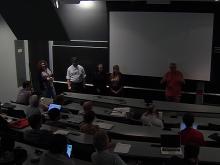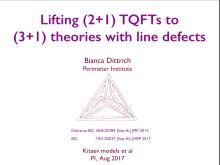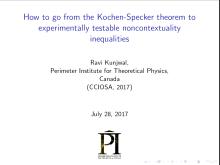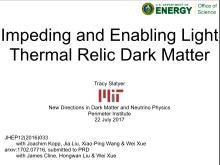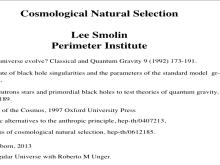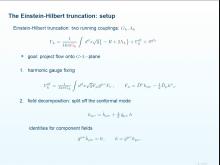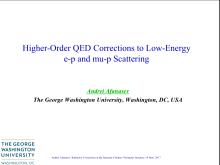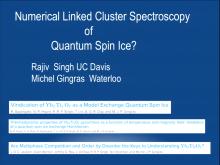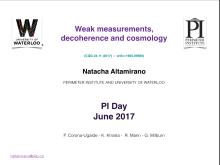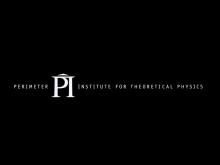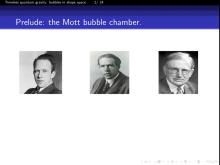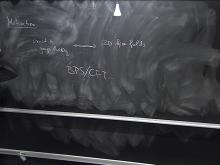Format results
-
24 talks-Collection NumberC17030
Talk
-

Welcome and Opening Remarks
Asimina Arvanitaki Perimeter Institute for Theoretical Physics
-

Theory Talk
Asimina Arvanitaki Perimeter Institute for Theoretical Physics
-

A three-dimensional optical lattice clock: precision at the 19th digit
Edward Marti University of Colorado Boulder
-

Measurement of the fine structure constant as a test of the standard model
Holger Mueller University of California, Berkeley
-

Superconducting accelerometer technology for precision tests of gravitation and search for new interactions
Ho Jung Paik University of Maryland, College Park
-

Searching for axions and new short-range forces with resonant sensors
Andrew Geraci University of Nevada Reno
-

Testing Gravity at Extreme Scales
Giorgio Gratta Stanford University
-

Precision Physics in Storage Rings
Yannis Semertzidis Institute for Basic Science
-
-
Talk
-

Semisimple Hopf algebras and fusion categories
Cesar Galindo Universidad de los Andes
-

The Hopf C*-algebraic quantum double models - symmetries beyond group theory
Andreas Bauer Freie Universität Berlin
-

Modular categories and the Witt group
Michael Mueger Radboud Universiteit Nijmegen
-

Topological Quantum Computation
Eric Rowell Texas A&M University
-

Gapped phases of matter vs. Topological field theories
Davide Gaiotto Perimeter Institute for Theoretical Physics
-

An Introduction to Hopf Algebra Gauge Theory
Derek Wise University of Erlangen-Nuremberg
-

Kitaev lattice models as a Hopf algebra gauge theory
Catherine Meusburger University of Erlangen-Nuremberg
-

Topological defects and higher-categorical structures
Jurgen Fuchs Karlstad University
-
-
Contextuality: Conceptual Issues, Operational Signatures, and Applications
23 talks-Collection NumberC17027Talk
-

Welcome and Opening Remarks
Robert Spekkens Perimeter Institute for Theoretical Physics
-

Quantum Mechanics in a New Key
Simon Kochen Princeton University
-

What do we learn about quantum theory from Kochen-Specker quantum contextuality?
Adan Cabello Universidad de Sevilla
-

Noncontextuality: how we should define it, why it is natural, and what to do about its failure
Robert Spekkens Perimeter Institute for Theoretical Physics
-

Towards a mathematical theory of contextuality
Samson Abramsky University of Oxford
-

Kochen-Specker contextuality: a hypergraph approach with operational equivalences
Ana Belen Sainz Gdańsk University of Technology
-

The contextual fraction as a measure of contextuality
Shane Mansfield University of Edinburgh
-

Nonlocality and contextuality as fine-tuning
Eric Cavalcanti Griffith University
-
-
New Directions in Dark Matter and Neutrino Physics
28 talks-Collection NumberC17026Talk
-

-

CRESST Detectors for Dark Matter and Neutrino Physics
Federica Petricca Max Planck Institute
-

Getting the Most out of Liquid Xenon
Rafael Lang Columbia University
-

-

-

Direct detection signals of light dark matter
Josef Pradler Austrian Academy of Sciences
-

-

-
-
Bounce Scenarios in Cosmology
16 talks-Collection NumberC17024Talk
-

Welcome and Opening Remarks
-
Steffen Gielen University of Sheffield
-
Neil Turok University of Edinburgh
-
-

Bounce in Loop Quantum Cosmology and its Implications
Abhay Ashtekar Pennsylvania State University
-

Observable Consequences of a Bounce
Ue-Li Pen Canadian Institute for Theoretical Astrophysics (CITA)
-

Challenges for Bouncing Cosmologies
Robert Brandenberger McGill University - Department of Physics
-

Emergent bouncing cosmology from quantum gravity condensates
Edward Wilson-Ewing University of New Brunswick
-

Discussion Session 2
-
Angelika Fertig TotalEnergies (France)
-
Steffen Gielen University of Sheffield
-
Elizabeth Gould Arthur B. McDonald Canadian Astroparticle Physics Research Institute
-
-

-

-
-
Making Quantum Gravity Computable
31 talks-Collection NumberC17023Talk
-

Welcome and Opening Remarks
Bianca Dittrich Perimeter Institute for Theoretical Physics
-

Introduction to Monte Carlo methods - 1
Gerard Barkema Utrecht University
-

Introduction to Monte Carlo methods - 2
Gerard Barkema Utrecht University
-

Introduction to Tensor Network methods - 1
Guifre Vidal Alphabet (United States)
-

Introduction to Tensor Network methods - 2
Guifre Vidal Alphabet (United States)
-

Tutorial: Introduction to Monte Carlo Methods
-
Gerard Barkema Utrecht University
-
Nilas Klitgaard Radboud Universiteit Nijmegen
-
-

Tutorial: Introduction to Tensor Network methods
-
Guifre Vidal Alphabet (United States)
-
Clement Delcamp Institut des Hautes Etudes Scientifiques (IHES)
-
-

Scientific Computing and Computational Science
Erik Schnetter Perimeter Institute for Theoretical Physics
-
-
Radiative Corrections at the Intensity Frontier of Particle Physics
12 talks-Collection NumberC17017Talk
-

-

Precision calculations for muonic bound states
Andrzej Czarnecki University of Alberta
-

-

SCET for precision physics at high and low energies
Thomas Becher University of Bern
-

Higher-order corrections for neutrino experiments
Kevin Mcfarland University of Rochester
-

New physics searches in low-energy experiments
Andre de Gouvea Northwestern University
-

-

Simulation tools for neutrino experiments
Gabriel Perdue Fermi National Accelerator Laboratory (Fermilab)
-
-
International Workshop on Quantum Spin Ice
20 talks-Collection NumberC17022Talk
-

Microscopic aspects of insulating rare-earth pyrochlore magnets
Jeffrey Rau University of Toronto
-

Lightning review on emergent quantum electrodynamics in quantum spin ice
Yong-Baek Kim University of Toronto
-

The importance of defects and structural flexibility in the physics of quantum spin ices
Tyrel McQueen Johns Hopkins University
-

Quasiparticle breakdown in the quantum pyrochlore Yb2Ti2O7 in magnetic field
Radu Coldea University of Oxford
-

Lobed phase diagram of single crystalline Yb2Ti2O7 in [111] magnetic field
Collin Broholm National Institute of Standards and Technology
-

Experimental signatures of phase competition in quantum XY pyrochlores
Alannah Hallas McMaster University
-

-

-
-
PI Day
14 talks-Collection NumberC17020Talk
-

-

-

Quantum tunneling with a Lorentzian path integral
Laura Sberna University of Nottingham
-

-

Topological field theories and gapped phases of matter
Lakshya Bhardwaj Harvard University
-

Gravity degrees of freedom on a null surface
Florian Hopfmueller Nord Quantique
-

Entanglement structure and UV regularization in cMERA
Adrian Franco Rubio University of Vienna
-

Lorentzian quantum cosmology
Job Feldbrugge Perimeter Institute for Theoretical Physics
-
-
4 Corners Southwest Ontario Condensed Matter Symposium 2017
11 talks-Collection NumberC17016Talk
-

-

Delafossite layered metals: intriguing physics in the high purity limit
Andrew Mackenzie Max Planck Institute
-

NMR signature of charge order in high Tc cuprates revisited
Takashi Imai McMaster University
-

Entanglement area law in superfluid 4He
Chris Herdman Institute for Quantum Computing (IQC)
-

-

Topological states in honeycomb materials
Hae-Young Kee University of Toronto
-

Many-body physics in a trapped ion quantum simulator
Kazi-Rajibul Islam Institute for Quantum Computing (IQC)
-

Understanding the Emergence of Chiral Spin Liquids in Mott Insulators
Ciaran Hickey University of Toronto
-
-
Shape Dynamics Workshop
16 talks-Collection NumberC17015Talk
-

Shape Dynamics: Perspectives and Problems
Julian Barbour University of Oxford
-

The quantum equation of state of the universe produces a small cosmological constant
Tim Koslowski Technical University of Applied Sciences Würzburg-Schweinfurt
-

Inflationary and pre-inflationary dynamics with the Starobinsky potential
Beatrice Bonga Radboud Universiteit Nijmegen
-

Relationalism and the speed of light: Are we in a relationship?
Yuri Bonder Universidad Nacional Autónoma De Mexico (UNAM)
-

Compact spherically symmetric solutions and gravitational collapse in SD
Flavio Mercati University of Naples Federico II
-

Self-gravitating fluid solutions of Shape Dynamics
Daniel Guariento Conestoga College
-

A Weyl-Type Theorem in Geometrized Newtonian Gravity, and How It May Bear on Shape Dynamics
Erik Curiel Ludwig-Maximilians-Universität München (LMU)
-

-
-
Quantum Field Theory on Manifolds with Boundary and the BV Formalism
12 talks-Collection NumberC17013Talk
-

Perturbative BV-BFV theories on manifolds with boundary
Alberto Cattaneo University of Zurich
-

G-actions in quantum mechanics (and spectral sequences and the cosmological constant)
Tudor Dimofte University of Edinburgh
-

Perturbative BV-BFV theories on manifolds with boundary Part 2
Alberto Cattaneo University of Zurich
-

Degenerate Field Theories and Boundary Theories
Philsang Yoo Seoul National University
-

Bulk-boundary BV quantization for 2-1 theories
Brian Williams Boston University
-

A link between AdS/CFT and Koszul duality
Kevin Costello Perimeter Institute for Theoretical Physics
-

Poisson Sigma Model with symplectic target
Francesco Bonechi National Institute for Nuclear Physics
-

Vertex algebras and BV master equation
Si Li Tsinghua University
-
-
Experimental techniques in table-top fundamental physics
24 talks-Collection NumberC17030In the last few years there has been a resurgence of interest in small scale high sensitivity experiments that look for new forces and new particles beyond the Standard Model. They promise to expand our understanding of the Cosmos and possibly explain mysteries such as Dark matter in a way that is complementary to colliders and other large scale experiments. There is a number of different physics motivations and approaches currently being explored in many on-going and newly proposed experiments and they often share common experimental techniques.Many workshops in this field focus on the theory motivations behind these experiments without emphasis on the details of the experimental techniques that enable precision measurements. There is also substantial experimental expertise across many fields, often outside of fundamental physics community, that can be relevant to ongoing and proposed experiments.Thus, we decided to organize the workshop around some of the common experimental techniques. We hope it will be educational for both experimentalists and theorists and lead to discussions on the best way forward. We would like to bring together experimentalists with different expertise in the hope that it will lead to new ideas through interdisciplinary interactions. For theorists, we expect it to provide better appreciation of the challenges and opportunities in improving the sensitivity of precision measurement experiments.
-
Hopf Algebras in Kitaev's Quantum Double Models: Mathematical Connections from Gauge Theory to Topological Quantum Computing and Categorical Quantum Mechanics
18 talks-Collection NumberC17029The Kitaev quantum double models are a family of topologically ordered spin models originally proposed to exploit the novel condensed matter phenomenology of topological phases for fault-tolerant quantum computation. Their physics is inherited from topological quantum field theories, while their underlying mathematical structure is based on a class of Hopf algebras. This structure is also seen across diverse fields of physics, and so allows connections to be made between the Kitaev models and topics as varied as quantum gauge theory and modified strong complementarity. This workshop will explore this shared mathematical structure and in so doing develop the connections between the fields of mathematical physics, quantum gravity, quantum information, condensed matter and quantum foundations.
-
Contextuality: Conceptual Issues, Operational Signatures, and Applications
23 talks-Collection NumberC170272017 marks 50 years since the seminal 1967 article of Kochen and Specker proving that quantum theory fails to admit of a noncontextual model. Despite the fact that the Kochen-Specker theorem is one of the seminal results concerning the foundations of quantum theory, there has never been a large conference dedicated to the subject. The 50-year anniversary of the theorem seems an opportune time to remedy this oversight. Furthermore, in the last decade, there have been tremendous advances in the field. New life has been breathed into the subject as old conceptual issues have been re-examined from a new information-theoretic perspective. Importantly, there has been great progress in making the notion of noncontextuality robust to noise and therefore experimentally testable. Finally, there is mounting evidence that the resource that powers many quantum advantages for information processing is contextuality. In particular, it has been shown to underlie the possibility of universal quantum computation. Many groups worldwide are actively engaged in advancing our knowledge on each of these fronts and in deepening our understanding of the distinction between quantum and classical theories through the lens of contextuality. Through this conference, we aim to bring together leading researchers in the field in order to develop a broader perspective on the issues, draw connections between different approaches, foster a more cohesive community, and set objectives for future research.
-
New Directions in Dark Matter and Neutrino Physics
28 talks-Collection NumberC17026Continuing investment in fundamental weakly-coupled science, primarily through neutrino experiments and dark matter searches, prompts the question: is the maximum possible scientific information going to be extracted from these experiments? Are there new creative uses of the existing and planned facilities that would advance our knowledge of fundamental physics? Are there physics targets that have been overlooked by the current approach? This workshop will attempt to advance discussion of these topics, and concentrate on non-traditional ideas and alternative methods of probing new physics, both at underground laboratories and at high-intensity accelerators. The workshop aims to complement the large international conference, Topics in Astroparticle and Underground Physics 2017, to be held in Sudbury ON July 24-28, by directly preceding that meeting.
-
-
Making Quantum Gravity Computable
31 talks-Collection NumberC17023Making Quantum Gravity Computable
-
Radiative Corrections at the Intensity Frontier of Particle Physics
12 talks-Collection NumberC17017Radiative Corrections at the Intensity Frontier of Particle Physics
-
International Workshop on Quantum Spin Ice
20 talks-Collection NumberC17022International Workshop on Quantum Spin Ice
-
-
4 Corners Southwest Ontario Condensed Matter Symposium 2017
11 talks-Collection NumberC17016This tenth annual one-day symposium aims to provide an opportunity for condensed matter researchers in Southwest Ontario to gather and discuss informally their most recent research. The general format of the meeting consists of 2 guest speakers and 5-7 contributed talks. The names of the contributing speakers and title of their talks will be announced later. Registration begins at 9:30 am. The meeting is expected to start around 9:45 am and end between 5-5:30 pm. A lunch will be provided by the Black Hole Bistro.
There will be two keynote speaker for the symposium; Professor Andrew Mackenzie from the Max Planck Institute for Chemical Physics of Solids,Dresden and Professor Anders Sandvik from Boston University. Their talk titles will be announced at a later date.
Registration for this event will open shortly.
-
-
Quantum Field Theory on Manifolds with Boundary and the BV Formalism
12 talks-Collection NumberC17013In the past five years their have a been number of significant advances in the mathematics of QFT on manifolds with boundary. The work of Cattaneo, Mnev, and Reshitihkin--beyond setting rigorous foundations--has led to many computable and salient examples. Similarly, the work of Costello (specifically projects joint with Gwilliam and Si Li) provides a framework (and deformation/obstruction) for the observable theory of such theories with boundary/defects. There are related mathematical advances: constructible factorization algebras and higher category theory as pioneered by Lurie and the collaboration of Ayala, Francis, and Tanaka. The goal of the workshop is to bring together the leading experts in this multi-faceted subject.The structure of the workshop will be such as to maximize the exchange of knowledge and collaboration. More specifically, the morning sessions will consist of several lecture series, while the afternoons will be reserved for research working groups. The mornings will communicate the essential ideas and techniques surrounding bulk-boundary correspondences and perturbative AKSZ theories on manifolds with boundary/corners. The afternoons will be research driven and focus on specific problems within the following realms: the interaction of renormalization with cutting/pasting, aspects of the AdS/CFT correspondence, cohomological approaches to gravity, and the observable/defect theory of AKSZ type theories.
